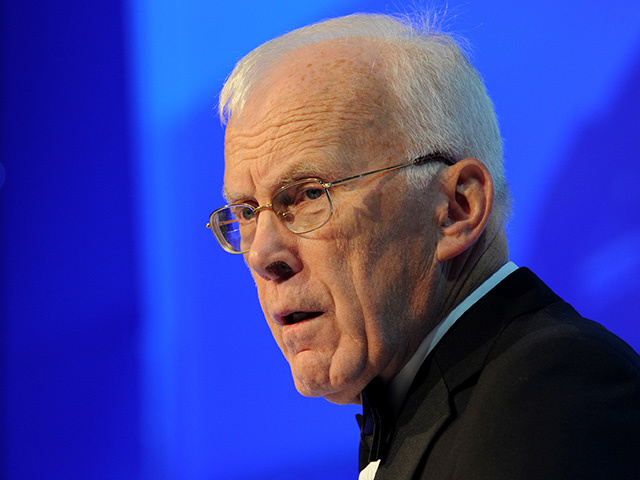
Sir Ian Wood has been persuaded to come out of retirement to draw up a major new blueprint for the future of the oil and gas industry.
The north-east entrepreneur said he had taken the job because there was a “huge prize” to be won if the full potential of the vital sector could be realised as it entered its “middle age”.
The UK Government asked Sir Ian to take charge of the first inquiry of its kind for more than two decades amid concerns that ageing offshore infrastructure is continuing to create “unprecedented challenges”.
Energy Secretary Ed Davey said the industry was reaching a “critical point” and that Sir Ian was the “obvious choice” to lead the review.
Sir Ian, who retired last year as chairman of Aberdeen-based oil services firm Wood Group, described the appointment as exciting and said maximising oil and gas recovery was “immensely important” for Britain’s economy.
He added that even modest improvements in issues such as production efficiency could produce huge economic value and create jobs.
Speaking to the Press and Journal yesterday, Sir Ian said he had not planned to come out of retirement.
“I wasn’t looking to do anything else,” he said. “I was conscious of the fact I had made my family promises.
“But this is an industry I have lived and breathed for the last 40 years. I know it really well. It felt like the right thing to do.”
Sir Ian is expected to report back with a series of recommendations for the UK Government early next year.
The study will examine the North Sea licensing regime “to ensure it is consistent with increasing exploration”, as well as extending the life of infrastructure, improving collaboration work and assessing the government’s stewardship.
“It’s a huge prize that is out there,” Sir Ian said. “If you could improve the recovery of all current fields out there by 1%, well, I don’t have the figures, but it would be worth billions.”
Production problems in recent years have led to revenue forecasts for the industry being slashed.
But sector leaders still believe output could be increased from current levels of about 1.5million barrels a day to 2million in the next few years.
At a joint press conference in Aberdeen and London yesterday, Sir Ian said: “It’s an exciting opportunity. It comes at a very important, opportune time.
“It’s probably about the right time, in terms of the transition to what I call ‘middle age’ in terms of the industry.
“I think this industry has still got a huge, huge potential and a long way to go, but there’s an enormous difference between the low end and the high end of potential recovery, and that’s what we’ll be working on.”
Mr Davey said: “I think we are at a critical point here. That’s why I think a focused, in-depth review is actually merited.
“Such a review has not been conducted since the early 1990s, when the challenges were very different from what we face now, so I think it is the right time.”
Mr Davey added that he expected Sir Ian’s report to “say tough things to the industry and no doubt say tough things to government as well”.
Malcolm Webb, chief executive of industry body Oil and Gas UK, said: “This review is a very welcome sign that the government does fully appreciate the need to maximise the recovery from the North Sea offshore areas.
“Too many people have decided that because we’re now mature, that we’re somehow over the hill.
“This inquiry and this review is absolutely properly timed.
“We believe that to unlock the potential of UKCS we’re going to need both sides to do this.
“It’s a partnership between government and industry and, frankly, we think both sides are going to have to up their game.”
Meanwhile Mr Davey has revealed that the Westminster coalition is preparing fresh tax changes for the oil and gas industry – but he promised no more “shocks and surprises”.
The Liberal Democrat MP made the comments after launching a new review of the North Sea sector, which will examine a wide range of issues, but not the fiscal regime.
The UK Government was accused of almost wiping out offshore investment in 2011 with a £10billion Budget tax raid on producers, which was announced without consultation.
Last year, the Treasury tried to repair the fractured relationship with long-awaited measures guaranteeing decommissioning tax relief, as well as new-field allowances.
When asked about further changes to the tax regime yesterday, Mr Davey said: “There will be changes – the question is whether the changes will be shocks and surprises or not.
“If you take recent changes that have been made, for example small field allowances, brown field allowances, decommissioning deeds – they are tax changes that have been developed with the industry and they meet the needs of a mature basin, and that’s the whole point.
“Although I can’t speak for the chancellor, no one suggests there won’t be any changes, it’s how those changes will be done, and whether they create an overall stable frame-work.
“That is certainly our determined objective, to keep the framework far more stable than we’ve seen sometimes in the past.”
Mr Davey insisted tax breaks for the industry were not subsidies.
“Let’s be absolutely clear, the Treasury only agrees to allowances if it knows it is going to benefit from the overall tax take going up as a result,” he said.
Recommended for you

